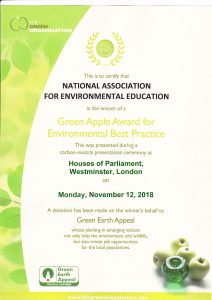 NAEE received a Green Apple award at a ceremony at the House of Commons last week at the 2018 International Green Apple awards. In particular this was in recognition of its project which provides bursaries to schools in Birmingham and the West Midlands. These allow young people to visit environmental study centres and link the visits with the development of environmental work across the curriculum. Known as Kenrick Days, the grant funding has been provided by the family of the late Hugh Kenrick, a noted environmental philanthropist from Birmingham. The award also cited the unique journal Environmental Education which NAEE has been publishing for over 50 years.
NAEE received a Green Apple award at a ceremony at the House of Commons last week at the 2018 International Green Apple awards. In particular this was in recognition of its project which provides bursaries to schools in Birmingham and the West Midlands. These allow young people to visit environmental study centres and link the visits with the development of environmental work across the curriculum. Known as Kenrick Days, the grant funding has been provided by the family of the late Hugh Kenrick, a noted environmental philanthropist from Birmingham. The award also cited the unique journal Environmental Education which NAEE has been publishing for over 50 years.
Here’s what Nina Hatch, NAEE’s Executive Chair, has to say in a recent blog about the award and the ceremony at the House of Commons that was held last week.
The 2019 ASE conference in Birmingham will have an ESD pathway which NAEE is contributing to. Our two sessions [Teaching Secondary / Primary Environmental Education Through STEM] will explore how STEM subjects can enable students to learn about the key environmental issues that we face. We shall use NAEE’s recent teacher handbooks, The Environmental Curriculum, and the sustainable development goals (SDGs) to help us do this using a mix of input and small group discussion. The full programme is here.
.
A digital Noah’s Ark project has been launched – the Earth BioGenome Project. This will be a digital repository that will contain a genetic blueprint of 1.5 million species of animal, plant, protozoa and fungi within a decade. The project website says:
“Powerful advances in genome sequencing technology, informatics, automation, and artificial intelligence, have propelled humankind to the threshold of a new beginning in understanding, utilizing, and conserving biodiversity. For the first time in history, it is possible to efficiently sequence the genomes of all known species, and to use genomics to help discover the remaining 80 to 90 percent of species that are currently hidden from science.”
Harris Lewin, who chairs the project, said at its launch in London: “It’s an insurance policy against the catastrophic collapse of entire ecosystems. If and when species go extinct we’re not going to lose a hundred million years of evolutionary history.”
.
The Australian Academy of Sciences has a video that sums up what October’s IPCC report is saying – in just over 2 minutes. If you want a more detailed picture, then the BBC has a 15 minute video c/o Newsnight. It includes a denier view from across the water. Then there are:
- The BBC – 5 Things We Learned from the IPCC Report
- The Guardian – One key take away from the IPCC Report
- The Climate Reality Project – 5 Key Take Aways
.
London’s Natural History Museum says you can meet the scientists tackling our planet’s most urgent environmental challenges, from seas of plastic to struggling coral reefs. You can reflect on The wonder of Earth, a touring artwork by UK artist Luke Jerram and join interactive theatre makers Coney on an immersive adventure to save the world from climate change: Friday 30 November 1800 to 2200. Details here.
.
Chris Willmore is giving her inaugural professorial lecture at Bristol University on Nov 28th (1730) in the Wills Memorial Building. In this Chris will be discussing the role of universities in delivering a more sustainable society, exploring the role of institutions, academics and students, posing the question of what we can all do to harness the energy and creativity within these institutions to assist in the transformation we need. It will focus in particular on how we can get young people engaged in what is going on to transform our cities and communities. There is no charge and you can register here.
.
Dorset based Theatre Company The Makeshift Ensemble are creating a new family play I am Turtle exploring the underwater world of Sea Turtles and how we can help look after their and our environment by reducing and rethinking our use of plastics. Creative director and puppet maker Jacqueline Avery says
“It is our passion to bring lively engaging theatre with a message to younger audiences, theatre is such a great way to bring stories to life and embed ways of doing and seeing things in times of huge environmental change. Children remember a good piece of theatre long after seeing it and to take away ideas of how to look after our planet and its inhabitants is a fantastic bonus! All the puppets in this performance are made from recycled materials and we can offer venues workshops on ‘recycled puppetry’ as an optional extra!”
The Company will be touring theatres and festivals from May and are also very keen to hear from any schools who think a performance and workshop would go down well at their setting. You can email jacquelinemakeshift@hotmail.com if you would like a performance for your school.
.
.
NAAEE says its 2019 conference will take place in Lexington, Kentucky from October 16 to 19. The Research Symposium will be from October 15 to 16. See you there, perhaps.
